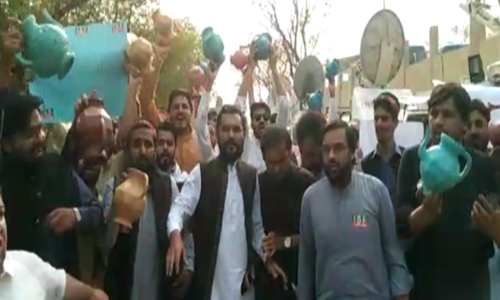WHAT smokescreens cannot hide is the fact that the prime minister has lost the confidence of the majority of the National Assembly, his position has become untenable and the delaying tactics by his government will fail to halt the inevitable.
This is the major takeaway from the developments taking place this weekend, including an attempt by the governing party to get the Supreme Court to settle a political question rather than have it answered on the floor of the National Assembly, where it ought to have been.
The prime minister’s reported meeting with the army and intel chiefs, which the president was also said to have attended, triggered a lot of speculation on social media, with the informed and the uninformed both tweeting their own desires regarding the content and outcome of the meeting as facts.
For its part, after Friday’s outrageous attack by PTI supporters led by two MNAs, the opposition went into a huddle on Saturday, after which all the leaders told the media that the prime minister’s time was up and warned him against seeking any unconstitutional solution to stay in office.
One is not sure whether this venom that has been injected into us can ever be sucked out again.
The prime minister was not sitting idle either and, apart from attending a public event near the capital, was said to be consulting top aides on survival strategies as it became evident that his majority in the National Assembly was fast shrinking and was approaching embarrassingly low numbers.
The country’s top law official, Attorney General Khalid Jawed Khan, was among those assisting the prime minister in finding a constitutional/legal loophole to remain in office. One strategy was to get the Supreme Court to put the fear of lifelong disqualification in the hearts of the dissenting PTI MNAs, whose number was said to be around three dozen.
Side by side with this public mobilisation was also a plan to put pressure on opponents, even after the Sindh House attack seemed to have backfired spectacularly as it drew condemnation from one and all including, it is believed, the security set-up. If the PTI’s planned rally slated for March 27 is not cancelled, it would be safe to assume the opposition will follow suit.
Editorial: Losing control
A Supreme Court bench headed by the chief justice that took up some of the matters related to the no-confidence move, including a plea to stop the rallies, seemed to take a dim view of the Sindh House attack and urged the government not to delay the parliamentary proceedings on the vote.
All eyes will be on the Supreme Court on Monday when it resumes the hearing after Saturday’s session was adjourned. The fate of the rallies may be decided and possibly the government’s question of whether floor-crossing parliamentarians will face lifelong disqualification.
Even if these issues are not settled, the proceedings, which are not likely to continue for long after the chief justice’s statement urging the government not to seek a delay in the vote, will be the focus of all interested parties.
Against this backdrop, despite their earlier stance that they will announce their decision at the eleventh hour, the ‘allies’, whose position is known to informed insiders, may well be persuaded to make clear their stance earlier, ie sometime next week, to those who are still hoping for a miracle.
To me, all the claims and counter-claims are no more than a smokescreen, including the apparent defiance of the PTI government and the denial of its supporters, when circumstances are pointing to a changed environment.
In less than two weeks, the prime minister is unlikely to be in office, a new dispensation may well be on its way, with everyone agreeing that the only workable long-term solution is fresh elections. To me, elections should be held as soon as electoral reforms have been approved by parliament.
If the reforms and/or the political interests of various elements that may make up the new set-up mean that the new elections can only happen in the next 12 months, so be it. But political and economic stability should not be sacrificed at the altar of expediency.
Also, having seen what a perilous minefield is created when political engineering goes wrong, and that not just the shirtless have to bear the burden of such botched experiments, one can only hope that the forces wielding immense extra-constitutional power bow to the will of the people.
Only an electoral exercise that is demonstrably above board will lead to a government and system that has the credibility to roll out the tough measures needed to steer clear of the crisis Pakistan is facing on all fronts — from economic to foreign policy to national security.
A seemingly bigger challenge will be to detoxify a considerable part of the body politic that has been fed a steady diet of self-righteous outrage and a narrative that anyone who does not mirror their views, no matter how unfounded, is a ‘looter and corrupt’.
Diversity of opinion in open societies is enriching and promotes critical thinking. We seem totally guided and informed by self-righteous outrage and hysteria, whether we discuss democracy, politics or economic policy, let alone matters of faith. Such bigotry is eating away at the roots of our society.
If you ask my honest opinion, we are so smug in our own silos that I am not even sure if this venom that has been injected into us can ever be sucked out again. Do we have someone who can somehow bridge these chasms? Wish I had an answer.
But I also firmly believe that leadership is developed over time and the sifting that is integral to a democratic process will throw up the right mix, the right people. In any case, authoritarianism is not the answer, as our own failed experiments show.
The writer is a former editor of Dawn.
abbas.nasir@hotmail.com
Published in Dawn, March 20th, 2022














































